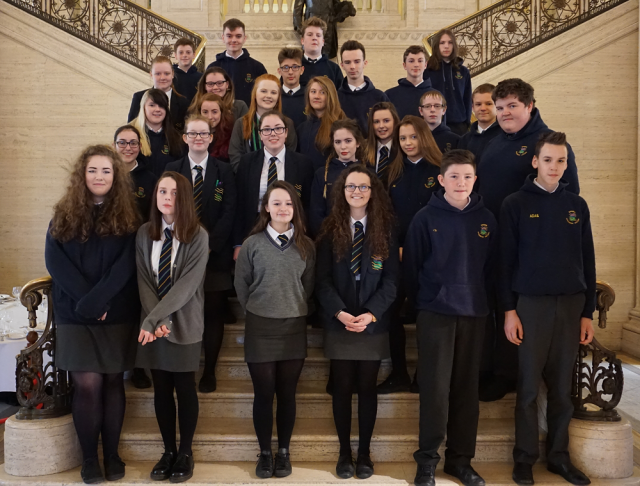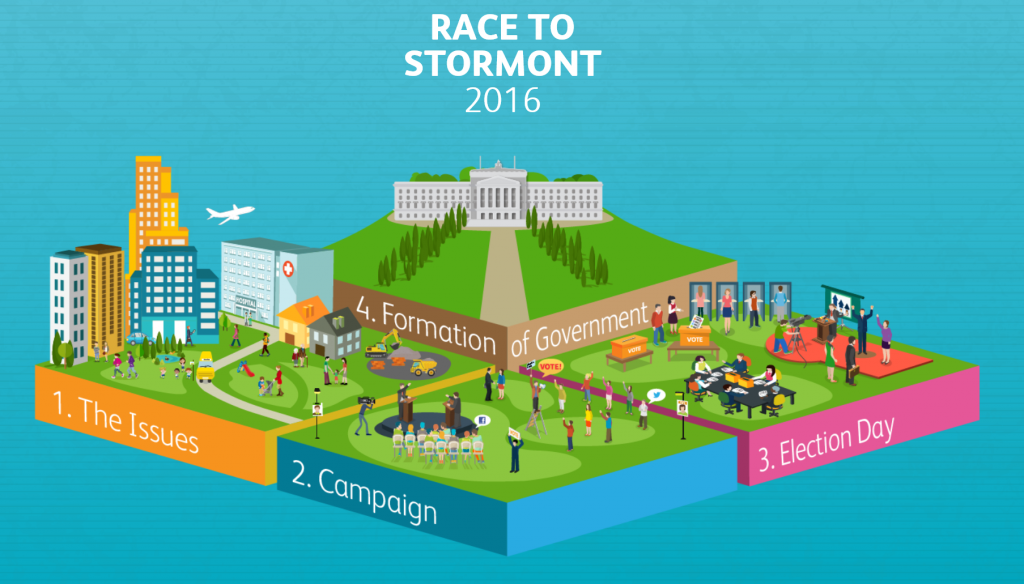The Assembly Education Service engaged with more than 80,000 young people during the last mandate. The aim of this work is to inform young people about the work of the Assembly and encourage them to get involved, but how does this work fit into the Northern Ireland Curriculum?

The statutory framework
Under the 2007 Education (Curriculum Minimum Content) Order (2007 No. 46), citizenship education became a statutory requirement in the curriculum for pupils in Key Stages 1 to 4 (ages 5 to 16). According to the Council for Curriculum, Examination and Assessment (CCEA), the rationale for this was: the importance of young people understanding how they are governed, and how they can participate in the democratic process to improve life for themselves and others; and the responsibility of education to support peace and stability in Northern Ireland (The Statutory Curriculum at Key Stage 3, Rationale and Detail CCEA, 2007).
Primary
At primary level Key Stages 1 and 2, Citizenship is found within the area of ‘Personal Development and Mutual Understanding’ (PDMU), which seeks to enable pupils to ‘play an active and meaningful part in the life of the community’. Pupils learn about the need for rules in society; how laws are created and implemented; and our ‘rights and responsibilities’ as members of the community.
Post-primary
At post-primary level there is an area of the curriculum called ‘Learning for Life and Work’ (LLW) and within that is found the key element of Local and Global Citizenship.
LLW is compulsory at Key Stages 3 and 4 (ages 11 to 16). It includes the study of ‘Diversity and Inclusion; Human Rights and Social Responsibilities; Equality and Social Justice; and Democracy and Active Participation’.
The Education Programme
During the 2011-16 mandate, 80,478 young people, from schools, colleges, youth groups and universities participated in the Northern Ireland Assembly’s Education Programme. The aim of the programme is to inform young people about the work of the Assembly and encourage them to get involved. Over 70% of participating groups are schools and the programme supports Northern Ireland Curriculum objectives, particularly in the areas of Citizenship, Politics, and History.
Through participation in the Assembly’s Education Programme, both primary and post-primary pupils learn about the role of the Assembly and Executive; how laws are made and how government is relevant to them. They will be made aware of issues considered by the Assembly and Executive; laws passed and decisions made; and how they can influence decision-making. The Education Programme experience includes interactive presentations, with use of videos and online resources; opportunities to meet MLAs, and activities including mock elections, debates and law-making workshops.
In addition to Citizenship, the Education Programme also supports other subjects, particularly AS Government and Politics, and History. Unit AS 1 of the GCE A-Level Government and Politics course focuses on the government and politics of Northern Ireland since 1998. It covers the Belfast/Good Friday Agreement, its principles, content and implementation, and changes made to it by subsequent agreements.
Students must also understand and evaluate the roles, operation and effectiveness of both the Assembly and the Executive, and to what extent the Assembly is independent of the Executive. This course also covers Northern Ireland political parties, their roles, backgrounds, strategies and policies, as well as their performance in elections since 1998. As part of their educational visit to Parliament Buildings, Politics students meet with MLAs from the parties represented in the Assembly. They receive a briefing from a Committee Clerk, and observe plenary sessions and/or committee meetings. The Education Service provides teachers with an electronic resource pack and the Post 16 section of the Education website provides further support including video material. For example, we have just created a set of videos called Academic Reflections involving Professors Rick Wilford from Queen’s University Belfast and Cathy Gormley-Heenan from Ulster University. The videos include their views on the 2016 Assembly election results, the performance of the Assembly and Executive in the 2011-16 mandate, challenges for the 2016-21 mandate, and the introduction of opposition They also address the question of whether or not the Belfast/Good Friday Agreement is still intact.
Other Education Service activities
Resources include a curriculum-linked website, developed in partnership with CCEA. This features interactive, media-rich games and activities, as well as teacher notes and lesson plans. A new Race to Stormont 2016 resource marked the recent election. Annual teacher conferences provide up-to-date information about the Assembly, lesson ideas and opportunities to meet MLAs. Special projects allow young people to explore issues and express their views. Regular ‘Let’s Talk’ events bring students from different schools together for discussions with elected representatives, helping to develop knowledge of issues, mutual understanding and communication skills.

The Erasmus + ‘Connections’ project (2015-16) involved young people researching and consulting on the issue of the mental health of young people. The young people interviewed stakeholders, facilitated focus groups, made films and presented findings to Assembly Committees, asking them to give greater priority to the issue in the new mandate.
Asking young people what they think
The Education Service also works with Assembly Committees to gather the views of young people on legislation and inquiry issues. In the 2011-16 mandate, using focus groups and online surveys, young people were consulted on the Road Traffic Bill, Addressing Bullying in Schools and Shared Education Bills; and on inquiry topics including School Inspections; Shared and Integrated Education, Together Building a United Community (TBUC) Strategy and School Councils. Reports on these issues can be found on the Committee pages of the Assembly’s website.
The context of the Northern Ireland Assembly and its activity-based education programme and resources also help develop cross-curricular skills like literacy (such as debating skills and the terminology of democracy); numeracy (for example, through understanding the budget, Single Transferable Vote and D’Hondt); communication; thinking; problem-solving; working with others and use of information and communication technology. The wide range of issues over which the Assembly has legislative authority means that many more subject areas can benefit from considering the work of the Assembly. The Education Service has supported the STEM Curriculum (Science, Technology, Engineering and Maths) by working with the Geological Survey of Northern Ireland to facilitate role play events which help contextualise government decisions. Indeed, all young people should leave school with an understanding of the importance of government and how to influence government decisions.
As this new mandate gains momentum, the Northern Ireland Assembly is committed to further developing its engagement with young people through its Education Service and other outreach programmes, and to listening to the views of young people on issues being considered by the Assembly. In doing so, it will continue to support schools as they deliver the key curriculum aim of enabling pupils to be active and effective participants in democracy and society.

